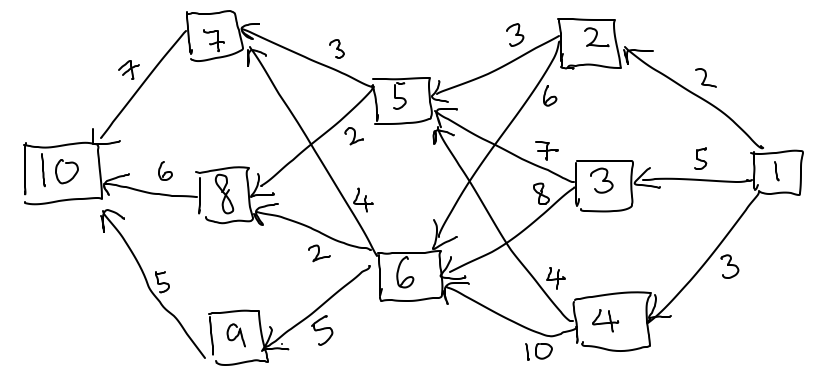Hey guys, I'm really stuck on this problem. I think you have to do backward recursion, but don't know how to go about it. I just need help with the algorthim for the function "backtracking".
Find the best cheapest way to get from city 1 to city 2. I have already found the cheapest way by hand, which city1 -> city 2 -> city 5 -> city 8 -> city 10.

Here is a picture of the diagram ^
THANKS IN ADVANCED!!
Here is the code I have so far.
#include <stdio.h>
int backTracking(not sure what to put here..)
{
//.....
}
}
int main (void)
{
//hard code all the prices
int cityOneTwo = 2;
int cityOneThree = 5;
int cityOneFour=3;
int cityTwoFive=3;
int cityTwoSix=6;
int cityThreeFive=7;
int cityThreeSix=8;
int cityFourSix= 10;
int cityFourFive=4;
int cityFiveEight=2;
int cityFiveSeven=3;
int citySixSeven=4;
int citySixEight=2;
int citySixNine= 5;
int cost[4][9]; //make an array for day and city... day 1 includes city 1, day 2 includes city 2,3,4... and so on
//day 4
cost[3][6]=7; //intiallize cost from city 7 to city 10
cost[3][7]=6; //intiallize cost from city 8 to city 10
cost[3][8]=5; //intiallize cost from city 9 to city 10
//day 3: city 5
int wayFiveSeven=cityFiveSeven + cost[3][6];
int wayFiveEight= cityFiveEight + cost[3][7];
if (wayFiveSeven<wayFiveEight)
cost[2][4] = wayFiveSeven;
else
cost[2][4] = wayFiveEight;
//day 3: city 6
int waySixSeven= citySixSeven + cost[3][6];
int waySixEight= citySixEight + cost[3][7];
int waySixNine= citySixNine + cost[3][8];
if (waySixSeven < waySixEight && waySixSeven <waySixNine)
cost[2][5]= waySixSeven;
else if (waySixEight < waySixSeven && waySixEight < waySixNine)
cost[2][5] = waySixEight;
else
cost[2][5] = waySixNine;
//day 2: city 4
int wayFourFive = cityFourFive + cost[2][4];
int wayFourSix= cityFourSix + cost[2][5];
if (wayFourFive<=wayFourSix)
cost[1][3]= wayFourFive;
else
cost[1][3]= wayFourSix;
//day 2: city 3
int wayThreeFive = cityThreeFive + cost[2][4];
int wayThreeSix = cityThreeSix + cost[2][5];
if (wayThreeFive <= wayThreeSix)
cost[1][2]= wayThreeFive;
else
cost[1][2]= wayThreeSix;
//day 2: city 2
int wayTwoFive= cityTwoFive + cost[2][4];
int wayTwoSix= cityTwoSix + cost[2][5];
if (wayTwoFive <= wayTwoSix)
cost[1][1]= wayTwoFive;
else
cost[1][1]= wayTwoSix;
//day 1: city 1
int wayOneTwo = cityOneTwo + cost[1][1];
int wayOneThree = cityOneThree + cost[1][2];
int wayOneFour = cityOneFour + cost[1][3];
if (wayOneTwo < wayOneThree && wayOneTwo < wayOneFour)
cost[0][0]= wayOneTwo;
else if (wayOneThree < wayOneTwo && wayOneThree < wayOneFour)
cost[0][0] = wayOneThree;
else
cost[0][0] = wayOneFour;
//determine the total cost
int totalcost= backTracking(not sure what to put here...);
}

